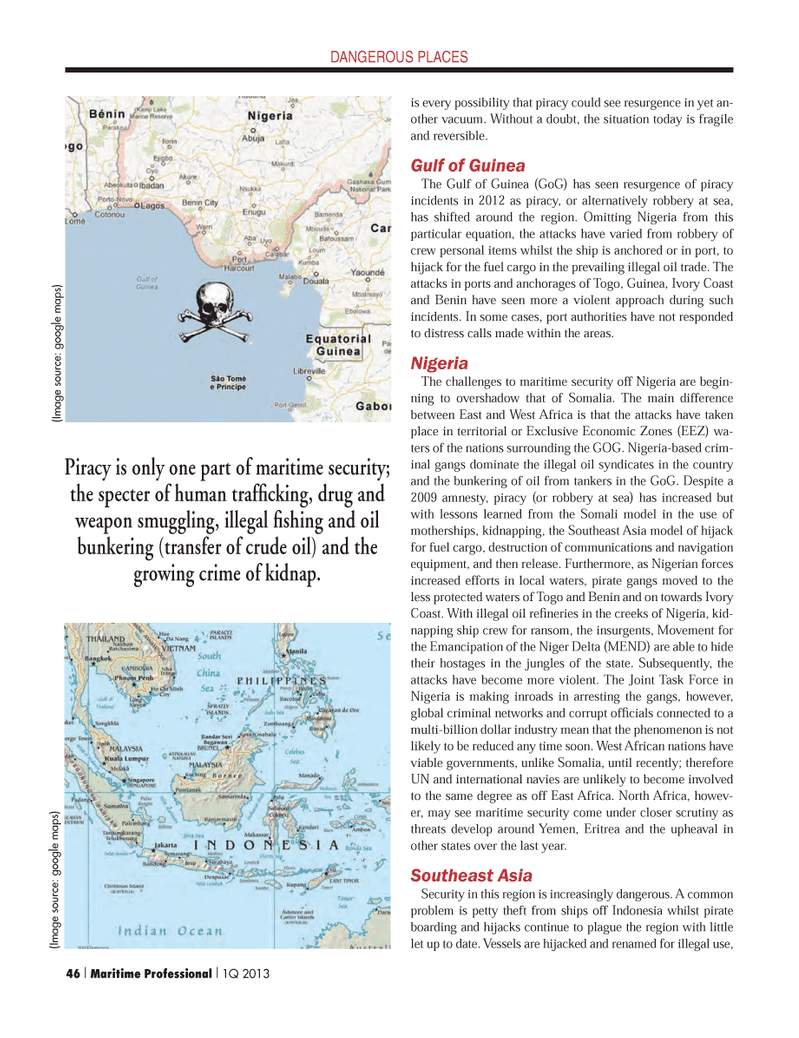
Page 46: of Maritime Logistics Professional Magazine (Q1 2013)
Maritime Risk
Read this page in Pdf, Flash or Html5 edition of Q1 2013 Maritime Logistics Professional Magazine
is every possibility that piracy could see resurgence in yet an- other vacuum. Without a doubt, the situation today is fragile and reversible. Gulf of Guinea The Gulf of Guinea (GoG) has seen resurgence of piracy incidents in 2012 as piracy, or alternatively robbery at sea, has shifted around the region. Omitting Nigeria from this particular equation, the attacks have varied from robbery of crew personal items whilst the ship is anchored or in port, to hijack for the fuel cargo in the prevailing illegal oil trade. The attacks in ports and anchorages of Togo, Guinea, Ivory Coast and Benin have seen more a violent approach during such incidents. In some cases, port authorities have not responded to distress calls made within the areas.NigeriaThe challenges to maritime security off Nigeria are begin- ning to overshadow that of Somalia. The main difference between East and West Africa is that the attacks have taken place in territorial or Exclusive Economic Zones (EEZ) wa- ters of the nations surrounding the GOG. Nigeria-based crim-inal gangs dominate the illegal oil syndicates in the country and the bunkering of oil from tankers in the GoG. Despite a 2009 amnesty, piracy (or robbery at sea) has increased but with lessons learned from the Somali model in the use of motherships, kidnapping, the Southeast Asia model of hijack for fuel cargo, destruction of communications and navigation equipment, and then release. Furthermore, as Nigerian forces increased efforts in local waters, pirate gangs moved to the less protected waters of Togo and Benin and on towards Ivory Coast. With illegal oil reÞ neries in the creeks of Nigeria, kid- napping ship crew for ransom, the insurgents, Movement for the Emancipation of the Niger Delta (MEND) are able to hide their hostages in the jungles of the state. Subsequently, the attacks have become more violent. The Joint Task Force in Nigeria is making inroads in arresting the gangs, however, global criminal networks and corrupt ofÞ cials connected to a multi-billion dollar industry mean that the phenomenon is not likely to be reduced any time soon. West African nations have viable governments, unlike Somalia, until recently; therefore UN and international navies are unlikely to become involved to the same degree as off East Africa. North Africa, howev- er, may see maritime security come under closer scrutiny as threats develop around Yemen, Eritrea and the upheaval in other states over the last year. Southeast AsiaSecurity in this region is increasingly dangerous. A common problem is petty theft from ships off Indonesia whilst pirate boarding and hijacks continue to plague the region with little let up to date. Vessels are hijacked and renamed for illegal use, DANGEROUS PLACES (Image source: google maps)(Image source: google maps)Piracy is only one part of maritime security; the specter of human trafÞ cking, drug and weapon smuggling, illegal Þ shing and oil bunkering (transfer of crude oil) and the growing crime of kidnap. 46 I Maritime Professional I 1Q 2013MP #1 34-49.indd 46MP #1 34-49.indd 462/22/2013 11:24:07 AM2/22/2013 11:24:07 AM

 45
45

 47
47
